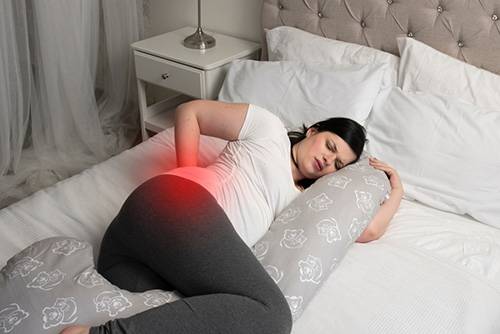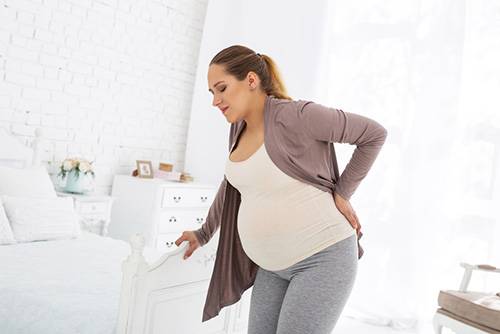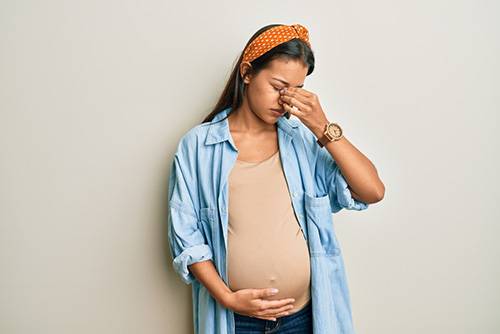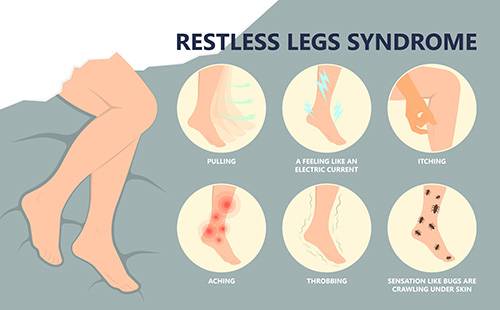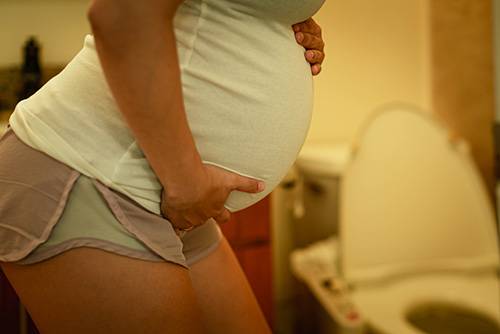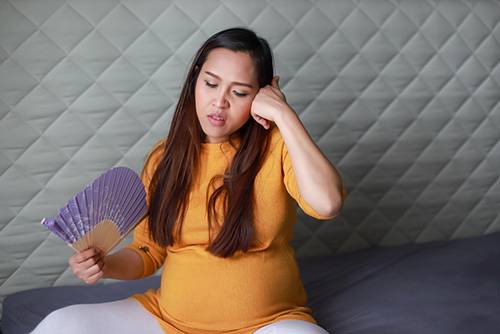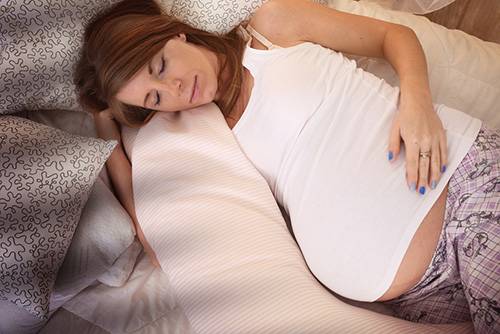
That’s life for you.
If you’re struggling to fall asleep, stay asleep, or get high enough quality sleep during your third trimester, you are not alone.
In this article, we’ll go over the most common reasons that women in their third trimester of pregnancy fail to get enough sleep. We’ll also give you some tips on how to curb these pregnancy symptoms for a more restful night, every night. Let’s go!
Why You’re Not Sleeping Well During Your Third Trimester
— Aches, Pains, and Discomfort
Many women experience all manner of aches and pains during their third trimester, and this can be especially frustrating while trying to sleep. There are two main stressors involved here:
— Weight gain
During pregnancy, the average woman gains upwards of 20 pounds in weight. This increase in weight can be attributed to the growing fetus, a growing uterus, extra fat storage, and a spike in hunger-inducing hormones like cortisol. While this weight gain is normal—and even necessary to ensure a safe delivery and a healthy baby—it often results in lower back pain and general discomfort.
A notable side effect of weight gain is poor posture, which can result in back pain as well as discomfort in other areas of the body. In addition, the added weight puts pressure on your joints and muscles which can trigger pain points throughout your body.
— Loosened joints and softened bones
During your third trimester, your joints loosen up and the ligaments near your hip bones become softer. These changes in your body serve to make the delivery process much smoother and safer, but they can also cause pain (especially when combined with the weight gain issues mentioned earlier).
— Snoring
Even if you’ve never snored a night in your life, you might just surprise yourself during the third trimester of your pregnancy. Many women struggle to sleep during their final trimester due to snoring- and breathing-related issues. This is normally caused by one of two things:
— Swollen nasal veins
A woman’s estrogen levels spike during the third trimester, resulting in (among other things) a condition known as rhinitis. This means that her nasal veins swell and make it difficult to breathe properly, especially while lying down to sleep at night.
— The uterus putting pressure on the diaphragm
Proper breathing can also be obstructed by the woman’s enlarged uterus pushing against her diaphragm.
Both of these issues can cause snoring as well as sleep apnea. While these symptoms are very common amongst pregnant women, they can result in negative pregnancy outcomes such as preeclampsia and health problems such as gestational diabetes and high blood pressure if not treated. You should always check with a doctor if something concerns you or if these problems are keeping you from getting adequate sleep.
Some women find that using nasal strips helps them sleep despite the swollen veins.
— Restless Leg Syndrome
Restless leg syndrome (RLS) is another common symptom plaguing women in their third trimester, with anywhere from 15% to 30% of women reporting it. Those with RLS experience discomfort or cramping in their legs throughout the night and feel the need to move them often, which hinders their ability to get a restful night’s sleep. But the good news is twofold:
1) This is not a symptom that should concern you; it normally goes away shortly after delivery.
2) The symptoms of RLS can sometimes be assuaged by taking supplemental iron or folic acid.
— Your Bladder
You pee right before bed. You pee an hour later. And then you pee again thirty minutes later. You finally drift asleep…get about three hours of shuteye…and then it hits again.
Sound familiar?
You’re in good company. Frequent (read: almost constant) urination is a common pregnancy symptom, especially during one’s third trimester. This is mainly because the uterus has grown quite large by this point and therefore puts extra pressure on your bladder. In addition, pregnancy can cause your kidneys to work overtime—which equates to double the peeing-all-night trouble.
— You’re Too Hot
Extra weight + increased metabolism = sweating through your sheets at night.
Science has shown that sleeping when you’re too warm is not ideal, but what’s a pregnant woman to do? If you find yourself tossing and turning at night, alternating between having the covers on and off, or often waking up drenched in sweat, you’re not alone.
Luckily, you can combat this issue by
- taking a warm or cool shower before lying down for bed.
- keeping the thermostat turned down to a cooler temperature (about 65°F is recommended).
- opening your windows at night to let the cool breeze in.
- sleeping in weather-appropriate pajamas and sheets.
— Your Growing Belly
We’ve already touched on a couple of ways your growing belly can disrupt sleep (extra weight and pressure), but we haven’t yet discussed how it affects your sleep position. The struggle is real when it comes to finding a position that’s both comfortable for you and not potentially damaging to the fetus.
Experts agree that sleeping on your side (especially your left side) is ideal during your third trimester, while sleeping on your back can harm your unborn baby. The stress involved with trying to sleep “correctly,” when combined with the process of getting used to a new sleep position, can make it super-difficult to sleep well at night.
Some women find that using a pregnancy pillow helps them sleep better as they adjust to new sleep positions. Alternatively, you may find relief in placing a regular pillow between your knees while sleeping in order to put less pressure on your joints when side-sleeping.
— Heartburn
As you approach your third trimester, you might want to stock up on the antacids! Most pregnant women experience frequent heartburn at night due to the slowing down of their digestive system, and this discomfort makes it difficult to sleep well at night.
— Vivid Dreams
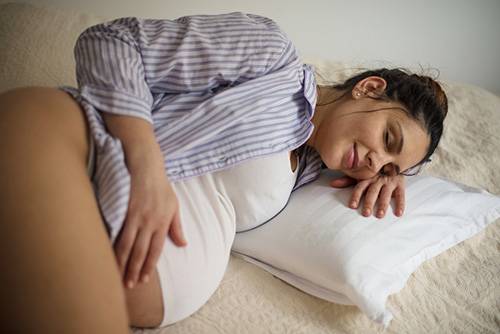
— Emotional Distress
Hormones. A growing fetus. The prospect of motherhood. A delivery date that’s quickly approaching. Your partner eating all of the leftover lasagna in the fridge, when that’s the only thing you were looking forward to all day.
Pregnancy comes with quite a few strings attached, including greater emotional distress and more frequent mood swings. When hormones combine with external stressors, good sleep can be hard to come by.
Tips for Getting a Good Night’s Sleep
Now that we’ve discussed the myriad factors that are probably keeping you from sleeping well during your third trimester, let’s go over some different tips for getting better sleep.
First, here are some remedies for the specific symptoms we covered:
| The Fix | |
| Aches, Pains, and Discomfort |
|
| Snoring |
|
| Restless Leg Syndrome |
|
| Your Bladder |
|
| You’re Too Hot |
|
| Your Growing Belly |
|
| Heartburn |
|
| Vivid Dreams |
|
| Emotional Distress |
|
And here are a few general tips for how to sleep better at night during your third trimester. (P.S.: Most of these are things you can apply to your sleep routine even after Baby is born!)
Avoid drinking any liquid before bed, and avoid heavy meals.

Set a regular bedtime (and waking-up time) for yourself.

Keep your bedroom dark at night.

Remember: Beds are for sleeping (and sexy-times).

If you can’t sleep, get up for a little while.
Tossing and turning, counting sheep, and all those other gimmicks are likely doing you more harm than good. In fact, they could be making you more agitated which will intensify the cycle.
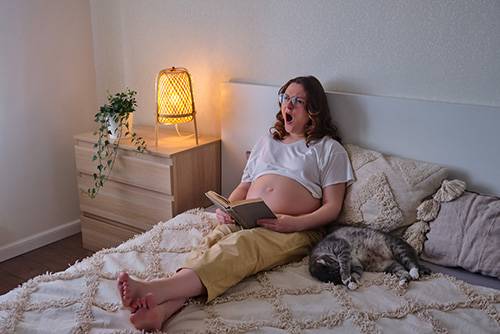
Of course, there are always things like:
- aromatherapy (lavender is great!).
- a noise machine.
- soft, soothing music.
- melatonin supplements (for occasional use only).
Conclusion
There you have it: The profusion of less-than-pleasant symptoms that could be causing you to lose sleep in your third trimester and a few tips on how to combat them.
We hope you learned something useful today and that you can start applying some of our tips to your next bedtime routine. Of course, if you have any questions on the topic or have a relevant experience you’d like to share, drop us a comment below! We’d love to hear from you.
Until next time, here’s to better sleep!
Photo credit: ArtFamily/Shutterstock; Anicka S/Shutterstock; Cocopelli/Shutterstock;
YAKOBCHUK VIACHESLAV/Shutterstock; gowithstock/Shutterstock;
Krakenimages.com/Shutterstock; Syda Productions/Shutterstock;
christinarosepix/Shutterstock; Onjira Leibe/Shutterstock; ambrozinio/Shutterstock;
fizkes/Shutterstock; Chris Tefme/Shutterstock; DG FotoStock/Shutterstock;
Impact Photography/Shutterstock; Monika Olszewska/Shutterstock;
Leszek Glasner/Shutterstock; kudla/Shutterstock; Zhuravlev Andrey/Shutterstock
